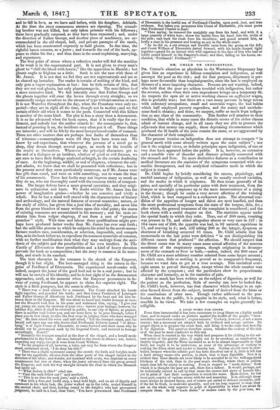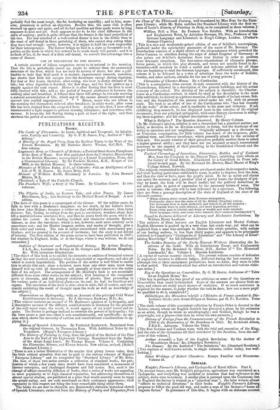DR. CHILD ON INDIGESTION.
DR. CHILD'S situation as physician to the Westminster Dispensary has given him an experience in bilious complaints and indigestion, as well amongst the poor as the rich ; and for that purpose, dispensary is per- haps more favourable than hospitalpractice, since the last is employed on diseases of a more imposing character. Persons are not wanting, indeed, who hold that the poor are seldom troubled with indigestion, but rather the reverse, unless when their own imprudence brings on a temporary fit. As respects the open air or active working classes on sqfficient wages, this is probably true; but there are a vast many persons in large towns with sedentary occupations, small and uncertain wages, the bad habits which half employed poverty engenders, and the scanty and unwhole- some food it obtains; and these, we suspect, suffer as much from indiges- tion as any class of the community. This farther evil attaches to their
condition, that while in many cases the dietetic errors of the richer classes admit of instant change, and in all cases they are able to procure the adjuvants that money can supply, those depressing circumstances which produced the ill health of the poor remain the same, or are aggravated by the character of their complaint.
The present treatise on indigestion does not attempt to compete " in general merit with some already written upon the same subject" ; nor has it the original views, or definite principles upon indigestion, of one or two that have appeared before the public. It is, however, an extensive and a sensible view of disorder and diseases primarily connected with the stomach and liver. Its more distinctive features as a contribution to medical literature are the statistics of the symptoms connected with sto- machic derangement, and the analytical exhaustive mode in which the subject is treated.
Dr. Child begins by briefly considering the causes, physiology, and
morbid anatomy of indigestion, as well as its usually received varieties, and the modes in which it originates. He then treats generally of its pains, and specially of its particular pains with their treatment, from the sharper or neuralgic symptoms up to the mere inconvenience of a rising in the throat; though he omits a very severe affection of the twisting kind, which is best compared to a corkscrew pain. The abnormal con- dition of the appetites of hunger and thirst are next handled, and then the more professional symptoms from the state of the tongue, skin, &o.; after which, the general treatment of the complaint is considered ; and the book closes with a useful chapter on diet. The statistics appear under the special heads to which they refer. Thus, out of 200 cases, vomiting was present in 73, and either altogether absent or very rare in 127: in 164 cases out of 200, the appetite was bad, in 62 natural, capricious in 1-1, and craving in 5; and, still taking 200 as the integer, dyspncea or shortness of breathing occurred 91 times. Dr. Child admits that his memoranda on the last point were deficient " in not distinguishing the different causes that produced" the affection. We should suspect that the direct cause was in many cases some actual affection of the mucous membrane of the respiratory organs, though originating in derange- ment of the stomach or liver or both,—unless, indeed, the 200 cases of Dr. Child are a mere arbitrary number selected from some larger amount; in which case, little or nothing is proved as to comparative frequency, because we want data to get at a true average. This statistical over- sight seems to prevail throughout, except where the whole number was affected by the symptom ; and the particulars show its proportionate character and intensity, as in the statistics of pain.
After so much has been written on the subject of digestion, as well for
the patient as the profession, little of novelty can now be looked for. Dr. Child's book, however, has that character which belongs to an opi- nion formed direct from the subject, instead of derived from the hints or the conclusions of other men. Though rather addressed to the pro- fession than to the public, it is popular in its style, and, what is better, sensible in its views. We take a few examples on topics generally in- telligible.
A GOOD WORD FOE COOKS.
From time immemorial it has been customary to heap blame on a highly useful class, and to regard cooks as plotters against the health of the people; "inna - merabiles ease morbos miraris? coquos Burners." Cookery, however, is not a men® luxury; but a necessary art adopted both by civilized and savage nations. Its proper object is to prepare the crude food, and bring it to the state that best fits it for digestion. The question therefore arises, whether the cookery of the rich or of the poor be most conducive to this end. When meat is roasted in the way which best prepares it for yielding to the sol- vent action of the gastricjuice, it ought not to be overdone, as mastication is thereby impeded, and the fibres hardened so as to be almost impermeable to that fluid; nor ought it to be underdone, as some of the advantage of cooking in making the fibres short and tender is thereby lost. Neither should meat be over- boiled, because when the soluble part has been dissolved out'of it, little is left but a hard stringy mass—the portion, in short, that is least digestible. Now it is evident that these details are more likely to 'be attended to in the well-appointed kitchens of the rich, than in the poor man's dwelling, where there is seldom mach time left for nicety in cooking. Even in respect to " made dishes," from which it is thought the poor are safe, there lies a fallacy. It would, perhaps, no be technically, correct to call by that name the messes and stews of humble life; yet in point of fact their composition is much the same. Made dishes, for the
most part, consist of various meats with fat and seasoning. Now, although these must always be deemed heavy, and of course not suited to delicate stomachs, still
if the fat be fresh, in moderate quantity, and not too long exposed to heat, they are on the whole very superior In point of digestibility to what I am about to compare them. In the " made dishes" or messes eaten by the poor man, we probably find the meat tough, the fat bothering on rancidity; and to him, more- over, greasiness is seldom an objection. Besides this, the same dish is often warmed up again and again, and all its bad qualities are thus made worse by long exposure to heat and air. Such appears to me tti be the chief difference in the style of cooking; and it is quite obvious that the former is the least prejudicial of the two. The real mischief of a well-cooked dinner is less in the dishes than in the want of self-denial in those partaking of them, who cannot stop eating when they have had enough: surely, however, it is unjust to hold the cook responsible for their intemperance. The former brings us food in a state as favourable to di gestion as the mode in which it is ordered to be made ready will permit; and it is no fault of his, if, for want of a little self-denial, we convert this advantage into a cause of disease.
USE OF BREAKFAST TO THE BILIOUS.
A certain amount of bilious congestion seems to be natural in the morning. That the bile is periodically stored up, might be inferred from the anatomical structure of the liver, which has not only its system of ducts, but also a gall- bladder to hold that fluid until it is wanted: experimental research, moreover, has shown that little bile escapes into the duodenum except during digestion. For four or five hours, therefore, after eating, the liver is slowly drained of its bile; but when digestion is finished, the flow stops, and the livergathers up a supply against the next repast. Hence it is after fasting that the liver is most fay charged with bile; and as the period of longest abstinence is between the evening meal and breakfast, it follows that there will always be towards morning a natural accumulation of bile, which any of the causes already mentioned may convert into morbid engorgement. * s * Hence, many who are bilious in the morning feel themselves relieved after breakfast; in other words, after some bile has been drained from the congested liver. Acting on this hint, I have often recommended a light supper to prevent morning biliousness, and sometimes with success. It keeps the bile flowing during a part at least of the night, and thus shortens the period of accumulation.



























 Previous page
Previous page